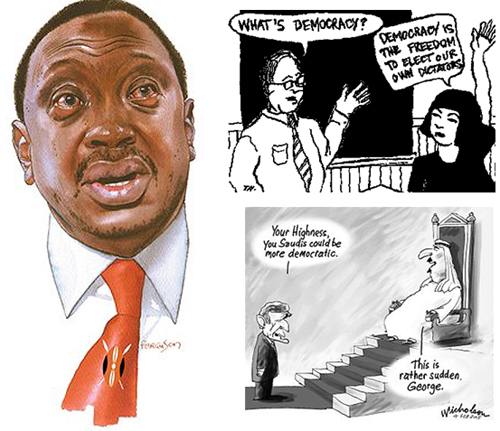
That doesn’t mean that the man with the most votes won; but we’ll never know that. 1.00% of the votes tallied may be illegitimate; Uhuru Kenyatta won with .07% of the votes. But since there was no rigging, the illegitimate votes could likely have spread out if not randomly, probably at the same percentage the candidates received legitimate votes.
The appeal process was fair if overly constrained by time. The concession by the opponent bringing the appeal was gracious and complete.
The implementation of the new Kenyan constitution looks good, albeit a clique of super loyal elites has been wrapped around the new president, taking advantage of constitutional loopholes that allow the president to appoint his cabinet and inner advisors with little advice or consent.
And Kenya is more peaceful than it’s been in several years. There are dark clouds on the horizon of economics and transparent journalism, but I wager many Kenyans prefer the social overcast to insecurity.
The above conclusions, of which I’m now convinced, are contained in a report issued yesterday by the European Union Election Observation Mission (EU EOM) to Kenya and by a less contextual and deeper historical analysis in the New York Review of Books by Joshua Hammer, Newsweek’s long serving African bureau chief.
The one outstanding issue is the scheduled trials of Kenya’s president and vice-president for crimes against humanity indicted by the International Criminal Court in The Hague (ICC). Will they be convicted? Will the trials even take place, now? And, most obviously and critically, are the charges valid?
I doubt the trials will proceed. This past weekend the Organization of African Unity laid a broadside attack on the ICC. Hammer refers to Bush Administration officials who were instrumental in ending the 2007/2008 violence who believe the charges are weak at best.
The Kenyan legislature refused to organize commissions to discern the guilty for the 2007/2008 violence and as a result of the agreement that ended the violence, ceded the investigations and trials to the ICC.
But now the new Kenyan legislature, packed with supporters of the newly elected leaders, wants to revisit that decision, and the ICC has said it’s open to considering such.
The way I can now see the Kenyan situation is not so dissimilar to my American one, Bush vs. Gore. And though at the time of Bush’s election he was not charged with anything criminal, that has certainly not been the case with many other American politicians:
David Vitter would have been a felon by his own admission had he not waited to so admit before the statue of limitations expired. He was subsequently elected and now serves as Senator from Louisiana.
Mark Sanford perjured himself as governor, resigned, and is now the newest representative for South Carolina.
By the way, there were even more important leaders who perjured but prevailed: Bill Clinton (Monica Lewinski), Ronald Reagan (Iran Contra) and George Bush (WMD). And don’t forget Tricky Dick, although most of you reading this probably weren’t born then.
Democracy does not guarantee honest guys get the job. The short list above is a very short list.
What failed in Kenya is what fails here at home: democracy. Imagine – and it’s quite possible to do so – Sarah Palin as America’s vice president or Michelle Bachman as president. More chilling, yet? Bush gets a heart attack and Dick Cheney becomes president.
The situation today in Kenya is much better than those imagined past hypotheticals.
Democracy as practiced by the ancient Greeks might have been better than the Claudius’ which followed, but modern times has seen the astute usually rich politician game the system almost to the point of rendering it useless.
So congratulations President Kenyatta and Vice-President Ruto. You have fully joined the world of democratic leaders.
Shame that now a majority of those fairly elected MPs have just given themselves a $10,000 per month (that’s right TEN THOUSAND US DOLLARS per month) salary. Still that’s democracy in action. Hard to be accurate when guesstimating the average wage earner’s salary in Kenya but it would be in the region of $100 – $200 a month – if you were lucky enough to have a job. Many many people work for much, much less than that.
Thank you for your insight into the Kenyan election. I’m glad you are willing to resume safaris to Kenya. That says a great deal.
Jim: I am SO glad to have your updated opinion as grandson Ben and I are going to Kenya in less that 2 weeks. Thanks for the Blog in general and this article right now. Judy
First It is US Sen. David Vitter, not David Vintor.
Second he only said he was on a phone log from a telephone company phone list of many numbers.
There was no crime comitted as alleged in the Blog statement. If you are going to represent yourself as an Author and a Reporter you must check your facts first, unless of course you are an employee of the US Attorney Generals office or CNN, MSNBC,ABC or CBS news.